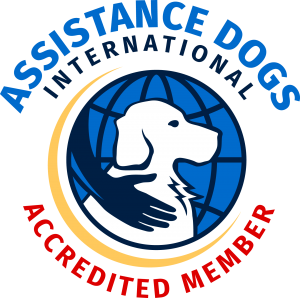COMMON QUESTIONS:
“Who qualifies to be considered for a service dog?”
Anyone with a documented disability may qualify for a service dog. Many of our dogs are for wheelchair or mobility issues. For example, brace dogs can be used for someone with Parkinson’s or MS. We also train dogs to respond after a seizure occurs, help guide individuals with partial sight loss, and alert to sounds for those with hearing loss. Documentation from a physician may be required before starting the process, which ensures that only people with disabilities receive our dogs. The dog must aide with a disability.
“What is a facility dog?”
Facility Dogs are expertly trained dogs who partner with a facilitator working in a health care, therapy, visitation, or education setting. The dogs work in professional environments and can perform over 40 commands designed to motivate and inspire clients with special needs.
“Who qualifies to be considered for a Skilled Facilitator Assisted Service Dog?”
These dogs may go to individuals with disabilities including, but not limited to, autism, Down’s Syndrome, or other developmental delays. The dog accompanies the child with a certified facilitator. These dogs may go where the facilitator and child go but are not certified for school. It may help with transitions from one location to another. The dog must help with a disability; it is not a family pet.
“How do I apply for a service dog or Skilled Facilitator Assisted Service dog?”
Once an application is received, the board will look at the application and decide which applicants will best benefit from the skills of our dogs. If you qualify, you will be notified and put on a waiting list. When it is time to start training for a dog, we will do a home visit and contact your veterinarian to be sure all animals in the home are spayed/neutered and up-to-date on shots. There is no charge for our service dogs. Once you are approved, you will start the training process. PGI reserves the right to deny anyone a service dog for any reason. If you would like to apply for a service dog click here.
“What is the training process to get a dog?”
All recipients must train in Peoria, IL weekly for several months to get a minimum of 25 hours of training. The purpose of these classes is to have the recipients work with many different dogs and learn the commands so they can control the dogs they receive. If you are unable to come to the training class in Peoria, please do not apply for a dog. Once the 25 hours are complete, you are officially on the list to get a dog. There will be three home visits with the dog before final placement.
“What are my requirements after receiving a dog?”
Recipients are required to come to weekly classes for one year after receiving the dog. This helps us to fine-tune the training and assist with additional skills the dog may need as the recipients’ needs change. Recipients are welcome to come to class for as long as they like and may join us for all outings. The cost of the dog’s vet care becomes yours after placement. Dogs must be kept up-to-date on shots, flea control, and heartworm prevention.
“Does everyone that applies for a dog receive one?”
No. We have a limited number of dogs, so we need to choose the recipients whose needs best meet the skills of our dogs. We reserve the right to deny a dog without stating a cause. Reasons for denial may include but aren’t limited to, failure to pass the home visit, poor veterinarian check, or past problems with animal control issues. We may also deny a dog to an individual if we do not feel we can train a dog to meet the individual’s needs.
“Can a dog be removed from my home?”
Yes. There are set rules you must follow, which include coming to the training class, keeping dogs up-to-date on shots and flea/heartworm control. If there are any signs of medical/physical neglect or mistreatment, the dog will be removed from the home.
“What happens if I no longer need the dog?”
Dogs that are no longer needed should be returned to the program so someone else can receive the dog. When the dog gets too old to work, we ask that you keep it as a family pet, and we will train another dog for you to use as a service dog. We feel a retired service dog will be much happier in the home it has lived in its whole life.
“What are the requirements to become a foster home?”
A foster family will commit to approximately a year and a half of training of their dog or puppy. They must come to weekly classes and will work with the person who eventually receives their dog. You must fill out an application, and a home visit and vet check will be scheduled to be sure all other animals in your house are fixed and up-to-date on medical treatment.
“I would like to volunteer, but can’t foster a dog. What else can I do?”
We can always use additional volunteers in training class. We rely heavily on Bradley volunteers and we could use more volunteers during the summer months when students go home. We also can use volunteers to help with public relations events and to help with mailings. Families are welcome to volunteer.
“Is there an age limit on who receives a dog?”
No, but a child must be old enough to be able to handle a dog or work with a dog alongside a facilitator. We suggest someone 9 years old or above, but each child will be evaluated on an individual basis to determine if he or she is ready for a dog. There is also no limit on how old the recipient may be. Anyone who can benefit from our dogs is welcome to apply.
I have a disability, have a great dog, and I would like it to be certified as a service dog. Will you certify my dog?”
No. We do not certify dogs that have not gone through our program. We spend a year evaluating and training our dogs. Our insurance requires that the dogs we certify go through our full program. We cannot determine in a few visits if a dog will be safe to have in a public setting, and placing a dog that may react negatively under stressful situations is a danger to the general public. We want to be sure every dog that wears a PGI vest has been properly trained.
“My apartment building doesn’t allow pets, so I want to get by dog certified as a service dog, or I want to take my dog on vacation with me and it needs to be a service dog. Can you certify my dog?”
NO! ADA law is for those with disabilities. Trying to certify a family pet as a service dog when there is not a disability is illegal and individuals can be charged with fraud if a landlord or someone else would like to prosecute. This law is to protect people with disabilities, and we will not help someone take advantage of this law.
“I have a 5 year old dog I can no longer take care of. Can I donate it to PGI?”
We work with area shelters to find the best dogs for our program. The dogs we take in the program are between 10 months and 1.5 years old. It takes a full year to train the dogs, so we can’t have older dogs just starting to train. We want the dog to be able to work for as long as possible. It can be difficult for the individual to retire his service dog to get another one, so we want young dogs to keep dogs and recipients together as long as possible.
“What happens to dogs that do not make it as service dogs?”
Occasionally, we have a dog fail to become a service dog. This is usually due to health problems, or inconsistency in public. We will let you know the reason the dog did not pass the program. You can be added to a waiting list for one of those dogs. We do a home visit and vet check before placing the dog in another home. All other animals in the home must be spayed or neutered and up-to-date on medical care. If you are interested please fill out a family pet application.
“Will you train my dog?”
The short answer is no. PGI carefully screens all dogs to the program and makes sure their temperament and nature fit our program. These dogs are then covered under our insurance for the duration of their training (which is conducted by our certified trainers. We are unable to train anyone’s personal pet.
“Can I train my own dog to be a PGI dog?”
PGI only works with our certified volunteers and our selected dogs. PGI dogs and trainers go through a rigorous testing phase and spend over 2 years in one-on-one training. Every person and their dog can benefit from knowing basic obedience skills, this is very different from how PGI trains our service dogs.
“What is the band that looks like a muzzle?”
We hear this question a lot and rest assured, it is NOT a muzzle. We utilize a tool called a Gentle Leader with many of our dogs. A head collar fits securely over a dog’s nose and gently redirects his head towards you when he pulls, preventing pulling. It works very well for our dogs who need that extra bit of redirection.
“How long of a wait list is there & why does it take so long?”
Currently, we are looking at an approximate wait time of one to two years depending on need. As an all-volunteer organization, we work with dogs in addition to our full-time jobs and family life. We want to make sure that our dogs are trained to their fullest potential and this requires a training time frame of about 1.5-2 years per dog. We have over 20 dogs in training and ask that if you are interested in acquiring a dog, please apply now and if the wait time speeds up, you’ll be informed.
“What is your take on fake service dogs?”
Fake service dogs are something that gets under all of our volunteer’s skin! Many people feel this is a harmless situation and we are here to say – it’s not. It’s not a victimless crime & every time a pet is passed off as a service dog, it can hurt the people who really need their service dog for their independence.
“Can any breed be a service dog?”
Any breed can be a great service dog. We pick our dogs based on years of experience and temperament testing. We have purebred dogs and mutts alike and they have all become superstars.
“I’d love to share what you do with my friends. How can I do that?”
We do many public outings throughout the year. Please watch our facebook page for more information on training and outings we have scheduled throughout the year. If you have questions and want more details on how to schedule a demo for your church, group or workplace, please contact us.
“What is the ADA’s take on service dogs?
Service Animal Defined by Title II and Title III of the ADA. A service animal means any dog that is individually trained to do work or perform tasks for the benefit of an individual with a disability, including a physical, sensory, psychiatric, intellectual, or other mental disability.
A public entity may ask if the animal is required because of a disability and what work or task the animal has been trained to perform. A public entity shall not require documentation, such as proof that the animal has been certified, trained, or licensed as a service animal.
“I have a service dog and received poor treatment from a business. What do I do?”
First, we are sorry that you were put into that spot. Know your rights (please see the ADA FAQ for more information) before you go into a situation and realize that many people are uneducated on what they can/can’t say or do regarding a service dog. Be sure to check back on our website as we continue to enhance our resources to help service dog owners. If you have a PGI service dog and encountered problems, please drop us a note and we can see what we can do to help.
What is our Non-Discrimination Policy?
PGI prohibits discrimination based on race, sex (including pregnancy, childbirth or related medical conditions), religious creed, color, national origin or ancestry, physical or mental disability, medical condition, marital status, age, sexual orientation, citizenship status, military service or veteran status, gender identity and gender expression or any other basis protected by federal, state or local law or ordinance or regulation.






